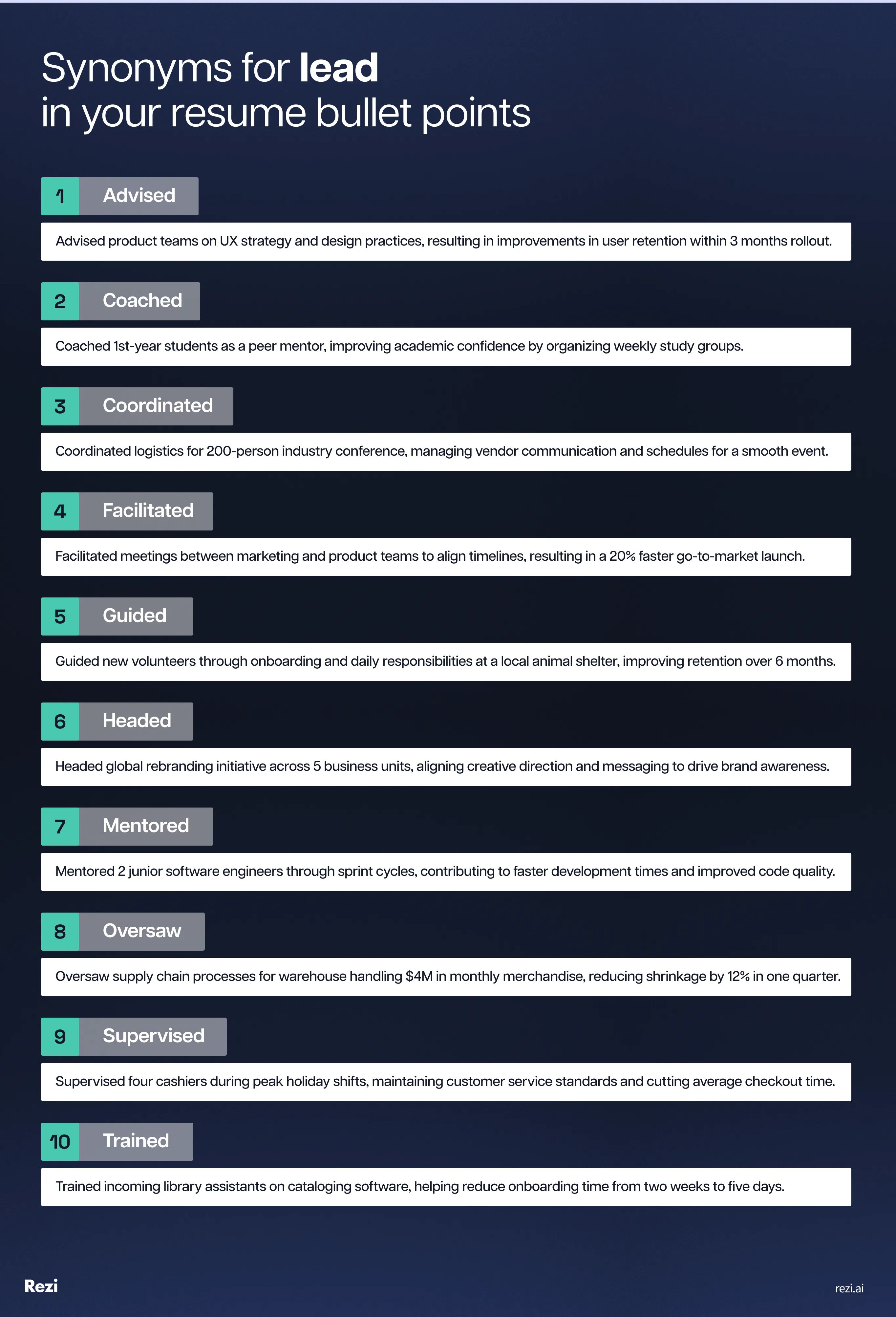Discover the best resume synonyms for lead, with examples and tips to help you describe your leadership experience and stand out to hiring managers.



“Lead” means to guide, direct, or take charge. You could be leading a group, making decisions, or showing others the way forward. On a resume, “lead” is often used to signal leadership, initiative, or ownership of a project or team.
While adding “lead” to your resume can show your position of authority, it doesn’t say much about your leadership style. Do you prefer one-on-one mentorship, or do you thrive when overseeing large teams? Mixing up your verbs with synonyms helps to clear that up and paint a more specific picture of how your skills fit the job description.
Let’s explore the best “lead” synonyms and how to use them. This guide will cover:
- The top resume synonyms for “lead”.
- How to use the right leadership synonyms for more impact.
- A range of examples and tips to help your skills stand out.
You don’t need to be an expert wordsmith to write a resume. Check out our free AI Resume Builder to personalize your application in minutes with tailored keyword suggestions.
30 Resume Synonyms for Lead
Adding strong “lead” synonyms to your resume helps convey your leadership skills, position on the ladder, and scope of responsibilities. Yes, it’s just one word, but the difference between “trained”, “coordinated”, and “oversaw” says a lot about the specifics of your role.
Check out the best “lead” alternatives and similar words to add to your resume.
Here’s how to use the top “lead” synonyms in your job application:

How to Replace “Lead” With Synonyms on Your Resume
There’s nothing wrong with using “lead” — it shows initiative, confidence, and expertise. But using it over and over is like telling the recruiter you’re a “good leader” on repeat. What does that actually say about your methods of leading? Using synonyms helps add more depth to your skills and experiences. Just make sure each word is intentional and best reflects your professional background.
Here’s how to swap “lead” for popular synonyms in your resume:
Mentored vs. Lead
“Mentored” reflects a more one-on-one form of leadership. It implies you’re invested in your team’s growth and success, not just delivering information.
“Led training sessions for new employees.”
“Mentored new hires through skill development, accelerating onboarding time and improving retention.”
Championed vs. Lead
“Championed” implies passion and advocacy. It shows you believed in the cause and took initiative, telling hiring managers you’re not just a task manager but a proactive team member.
“Led customer support initiatives.”
“Championed customer support improvements by advocating for process automation and launching new support channels.”
Directed vs. Lead
“Directed” is stronger and more formal, suggesting leadership with creative and operational oversight. It signals authority and structure over an organization, activity, or project.
“Led the design team during product development.”
“Directed the design team through prototyping and user testing to refine key product features.”
Oversaw vs. Lead
“Oversaw” shows you managed and participated in the bigger picture. It suggests accountability for success and the ability to manage change across technical and human systems.
“Led the transition to a new software platform.”
“Oversaw the end-to-end transition to a new enterprise platform, ensuring zero data loss and full team adoption.”
Coordinated vs. Lead
“Coordinated” implies hands-on organization and interpersonal skills. It emphasizes your ability to manage collaboration, resources, and timing as a leader and within a group setting.
“Led a team of analysts on quarterly reporting.”
“Coordinated a team of analysts to improve quarterly reporting processes, cutting turnaround time by 25%.”
Organized vs. Lead
“Organized” stresses your planning and execution skills. It implies you didn’t just give out orders; you were responsible for managing the moving pieces and bringing everything together.
“Led a volunteer outreach program.”
“Organized and expanded a community outreach program, increasing volunteer participation by 60% and broadening impact.”
Supervised vs. Lead
“Supervised” suggests accountability and people management. It’s especially effective when you want to highlight your responsibility over a process or team without overstating it.
“Led the QA team for software release.”
“Supervised the QA team during final software testing phases, ensuring compliance with performance and security benchmarks.”
Guided vs. Lead
“Guided” signals supportive leadership under pressure, showing that you lead with clarity and patience when it matters most. It also suggests collaboration, not just authority.
“Led a team during crisis response.”
“Guided my team’s efforts during a high-stakes incident, stabilizing operations, and restoring service in under 24 hours.”
Drove vs. Lead
“Drove” is assertive and results-oriented. It emphasizes momentum, initiative, and measurable impact, which is great for tech and operations-focused roles.
“Led the development of internal tools.”
“Drove the creation of internal automation tools that saved 100+ hours across teams.”
Motivated vs. Lead
“Motivated” demonstrates your goal-oriented leadership style and strong communication skills. It shows you know how to inspire others and lead them toward success.
“Led my team in reaching sales goals.”
“Motivated a high-performing sales team to exceed quarterly targets by 18% through coaching and performance incentives.”
Best “Lead” Synonym Examples
Using the right “lead” synonyms has the power to convey why you’re the right fit for the role. Does the job ad mention training new hires? Then you can add “advised” and mentored”. Or maybe the position is part of a large team, where “coordinated” or “headed” is more appropriate.
But don’t just rely on the synonyms. You should back yourself up with resume achievements, quantitative outcomes, and results-focused duties. Here’s how to do it:
1. Advised
“Advised” shows you were a trusted voice with enough knowledge and expertise to help others make decisions. It conveys expertise, influence, and people skills. This synonym works well in environments where you have to provide informed guidance without necessarily being in charge.
Examples:
• Advised team leaders in introducing rapid and effective workflows to reduce project delivery time.
• Advised senior clients on risk mitigation strategies for compliance audits.
• Advised student government on budgeting priorities, leading to better funding allocation.
2. Coached
“Coached” is great when you’ve helped people grow. It shows that you lead with support, encouragement, and development in mind, not just direction. It fits well for onboarding, customer success, sales management, and any role focused on team development or training.
Examples:
• Coached a team of junior analysts, leading to three promotions within six months.
• Coached underperforming reps on sales techniques, resulting in a 25% increase in close rates.
• Coached new hires as part of the onboarding committee during the internship program.
3. Coordinated
“Coordinated” shows you’re great at organization and logistics. It implies you handled multiple moving parts, such as people, resources, and timelines, to keep things running smoothly. It’s ideal for team-focused environments, such as event planning, operational roles, and administrative positions.
Examples:
• Coordinated product launch activities across design, marketing, and engineering teams.
• Coordinated monthly reporting efforts with finance and data teams to meet tight deadlines.
• Coordinated student volunteer events, increasing participation and engagement.
4. Facilitated
“Facilitated” suggests leadership through communication and support. You made collaboration happen, cleared roadblocks, and got people aligned. It implies you go beyond basic leadership to improve systems, operations, discussions, and workflows.
Examples:
• Facilitated cross-departmental planning sessions to align goals for the Q3 roadmap.
• Facilitated leadership workshops on inclusive management for 50+ employees.
• Facilitated peer discussion groups on ethics and diversity as a student group leader.
5. Guided
“Guided” is great when you’ve led by example or provided thoughtful direction, especially through onboarding, challenges, or change. It carries a tone of support and influence, ideal for team leadership, customer-facing roles, education, or mentorship.
Examples:
• Guided a team of five through a high-pressure product release with no missed deadlines.
• Guided new customers through the onboarding process, improving new employee feedback.
• Guided first-year students as part of the university orientation leader program.
6. Headed
“Headed” gives off a strong leadership energy. It tells people you were in charge of a team, a project, or a department. It’s direct and confident, making it perfect for executives, team leads, project managers, or anyone with ultimate responsibility.
Examples:
• Headed a regional expansion project that opened five new offices in under a year.
• Headed the rebranding initiative for a portfolio of legacy products.
• Headed fundraising efforts for student organization, surpassing goals by 50%.
7. Mentored
“Mentored” implies that your leadership style focuses on care and growth. It suggests long-term support, personalized advice, and a hands-on approach to developing others. Perfect for team leads, educators, senior contributors, and volunteer or coaching roles.
Examples:
• Mentored junior developers on coding best practices and peer reviews.
• Mentored interns through career development workshops and weekly check-ins.
• Mentored at-risk youth through a nonprofit partnership program.
8. Oversaw
“Oversaw” is a professional way of saying you were in charge of something and responsible for its outcomes within a team, process, or function. It implies trust, accountability, and high-level management. This is common in operations, finance, compliance, or team supervision roles.
Examples:
• Oversaw day-to-day operations of a 12-person sales team with a $5 million annual quota.
• Oversaw QA processes during the final testing phase of a product launch.
• Oversaw budget allocations for a student organization with over 200 members.
9. Supervised
“Supervised” works well when you were directly responsible for others’ work, especially in hands-on or operational roles. It’s not as one-on-one as “mentored” or “guided,” but still shows accountability, people management, and attention to detail amongst larger groups.
Examples:
• Supervised front-line client support staff across two locations, maintaining 95% customer satisfaction.
• Supervised data entry contractors to ensure accuracy and compliance with regulations.
• Supervised student staff during campus move-in weekend with over 500 students.
10. Trained
“Trained” is a great choice when you helped people learn new skills, tools, or systems. It conveys confidence in your own knowledge and the ability to pass it on. It also implies that you’re not just satisfied with the status quo; you’re committed to encouraging your thrive in the workplace.
Examples:
• Trained 30+ employees on CRM software, resulting in faster adoption and fewer support tickets.
• Trained new hires on internal policies and customer service standards.
• Trained classmates on research methods as a teaching assistant in the psychology lab.
When You Should Still Use “Lead” in Your Resume
Creating a standout resume isn’t just about listing your experience. Like any good story, you have to grab the reader’s attention with the right words. Plenty of candidates (aka, your competition) may have similar backgrounds, so how you frame your skills and tailor the language can instantly set you apart.
Check out these expert tips and powerful synonyms to help your resume get noticed.
- Match the synonym to the type of leadership. Being strategic with your verb choice makes your role sound less generic and more suited to the leadership style the company wants. For example, “supervised” fits when you managed day-to-day tasks and direct reports. “Coached” works when you support others without formal authority.
- Tailor your leadership language to match the job posting. If the job ad says they’re looking for someone to “mentor,” “coordinate,” or “drive initiatives,” echo those exact words in your resume (where it’s truthful). Using aligned synonyms shows you understand the role and helps your resume get past keyword filters.
- Avoid repetition. You want to show your leadership skills, but there’s more than one way to prove you’re a good leader. Rotate in synonyms that highlight different aspects of your leadership: mentored shows people development, oversaw implies responsibility, and facilitated shows collaboration, and so on.
- Use leadership words even if you weren’t a manager. You don’t need a formal title to lead. It still counts if you ran a student project, mentored a teammate, or organized a volunteer event. Using words like coordinated, facilitated, or initiated can show leadership without sounding inflated.
- Focus on results. No matter which synonym you use, follow it with what you did and why it mattered. Instead of “coordinated weekly meetings,” say “coordinated weekly syncs to fast-track decision-making and avoid project delays.” Actions with impact show what you can contribute to the company.
- Don’t lie or exaggerate the truth. If you didn’t actually lead, guide, or coach, don’t pretend you did. You can still show initiative with words like supported, contributed to, or assisted on. Honesty matters, and hiring managers spot over-the-top language.
FAQ
What is another word for lead on a resume?
Another word for lead on a resume depends on what kind of leadership you want to convey. If you managed a project, you might say coordinated or spearheaded. If you supported a team’s growth, use mentored or coached. For more formal authority, try oversaw, directed, or managed.
How do you say leader on a resume?
Instead of just saying “leader,” show how you led. Phrases like “team lead for product launch,” “project coordinator,” or “go-to person for onboarding new hires” say more than the word alone. You can also work it into your resume summary, like “proven leader in cross-functional collaboration,” but back it up in bullet points with action verbs in your work experience section to show the real work behind the title.
What is another word for lead in a job title?
In a job title, you can swap lead with words like manager, coordinator, supervisor, head, or strategist (depending on the role). For example, “Team Lead” might also appear as “Operations Manager” or “Project Coordinator.” If you’re rewriting your title for clarity, choose the one that best reflects your scope of responsibility and level of seniority. You can also align your job title with the role from the job description.
How do you put lead on a resume?
You want to go beyond just saying “led.” Start each resume bullet point with a strong synonym that fits your role: mentored, supervised, headed, or guided. Then immediately follow it with what you led and what impact it had. For example: “Guided a team of 6 to launch a mobile app, increasing engagement by 40%.”
What is a fancy word for lead?
If you want a more elevated or “fancy” word for lead, try spearheaded, championed, or directed. These verbs sound professional while also giving a clearer picture of your role. Spearheaded implies initiative, orchestrated shows coordination, and championed conveys passion and advocacy. Choose the one that fits your leadership style and the tone of your resume.
Lauren Bedford
Lauren Bedford is a seasoned writer with a track record of helping thousands of readers find practical solutions over the past five years. She's tackled a range of topics, always striving to simplify complex jargon. At Rezi, Lauren aims to craft genuine and actionable content that guides readers in creating standout resumes to land their dream jobs.



